Porto is an incredible city both to visit and to live in. With an important industrial pole and the fourth most populous municipality in the country, it also has a vast educational and cultural offer. In addition, it is a safe city, with good infrastructure, many restaurants, shops and places of interest.
However, the choice of a new residence does not obey to such generic criteria, as it is a delicate process with many variables to consider.
Therefore, I present you some of the essential topics to assist your choice, if you want to live in Porto:
Housing: Finding a house to live in Porto

Finding a house is one of the most important aspects if you want to live in Porto. Here, it is common to find apartments of different types – T0, T1, T2, etc., depending on the number of bedrooms – old or modern, with or without furniture. It all depends on what you are looking for.
However, if you plan to live in Porto, please note that, due to strong demand, rents are not very affordable (check below the average prices). On the other hand, it is cheaper than the capital, Lisbon.
Where to look for a house in Porto
You can start your search online, using sites such as Custo Justo, Imovirtual or Idealista.
If you prefer a more personalized process, the main real estate companies with offers in Porto are ERA, REMAX and Frontal. There are other possibilities, but these are a good starting point.
Average prices for renting or buying a house in Porto
Prices are always variable, and the values below are not exact, but, on average, you can expect to pay these values to live in Porto:
| Type of House | Average Price (Oct. 2020) |
|---|---|
| T1 Rental (apartament w/ 1 bedroom) in the city centre* | 693€ |
| T1 Rental (apartament w/ 1 bedroom) in the suburbs* | 520€ |
| T3 Rental (apartament w/ 3 bedrooms) in the city centre* | 1263€ |
| T3 Rental (apartament w/ 3 bedrooms) in the suburbs* | 899€ |
* Values provided by Numbeo
The average prices to buy a house in Porto are as follows:
| Average price / m² to buy a house in the city of Porto ** | 2879€ |
| Average price / m² to buy a house in the region of Porto ** | 2064€ |
** Values provided by Idealista
Required documents
Generally, in the case of rental, the following documents are requested: identification document, NIF (tax identity), proof of employment, advance payment (which can vary from 2 to 6 months of rent) and, eventually, a guarantor.
In the case of purchase, in addition to the identification document (which may also be the residence permit), the NIF and proof of employment, you must have the land registration certificate (used to confirm the legitimacy of the owner and the buyer), the building booklet with the tax status of the property (obtained from the Finances department in Portugal), housing license (which sets out the purpose of the property), and the housing technical sheet, with the property description.
Live in Porto: Monthly cost of Food

In Portugal, you will find large supermarket chains such as Continente, Pingo Doce, Mini-Preço or Lidl. Although there are small price variations between them, these are, overall, minimal, because the products are tabulated at national level. These are the average prices of the most common food products:
| Products | Average Price (Oct. 2020) |
|---|---|
| 1 Lt milk | 0,63€ |
| 12 eggs | 1,75€ |
| 1 kg of rice | 0,87€ |
| 1 kg of chicken’s breast | 5,23€ |
| 1 kg of beef | 9,88€ |
| 1 kg of apples | 1,70€ |
| 1 kg of potatoes | 1,23€ |
| 1,5 L of water | 0,53€ |
| 1 bottle of wine | 4,00€ |
| 0,5 L of Portuguese beer | 1,14€ |
Data provided by Numbeo
Please note the following:
– The cost of food in Porto is lower than in most European cities.
– The supermarket chains apply many weekly discounts, so it pays off to pay attention to the brochures.
– If you want to squeeze costs with the supermarket, choose the supermarket’s own brand, which, in most products, have the same quality as other more expensive brands.
– You can buy meat in supermarkets (which is the cheapest and what most people do), or you can buy in trusted butchers.
– The cheapest fish is also found in supermarkets, but nothing beats the quality (and the experience) of buying a good sea bass at Mercado de Matosinhos (every day) or in Angeiras (on Saturday mornings).
In addition to supermarkets, there are other interesting options for those who want to live in Porto: grocery stores and organic markets.
Grocery stores
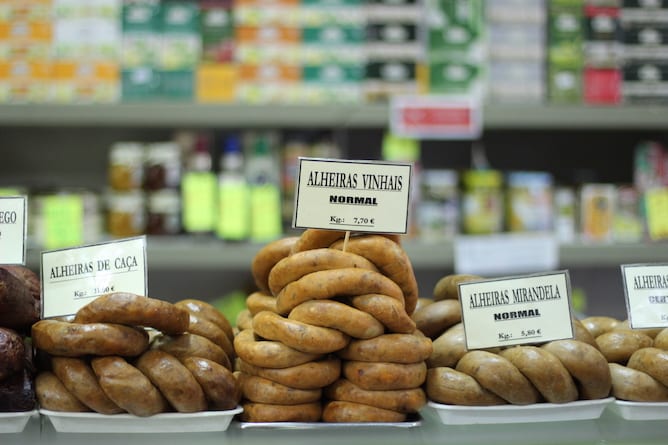
If, like me, you are a fan of local commerce, don’t worry: there are plenty of grocery stores in Porto (called mercearias, in Portuguese) where you can buy fruits, vegetables, cereals, legumes, wines, fresh bread and cleaning products. They are usually a little more expensive but, in my experience, the quality of the fresh products is higher. Besides, they are great if you find yourself unexpectedly without flour or sugar.
Biological markets
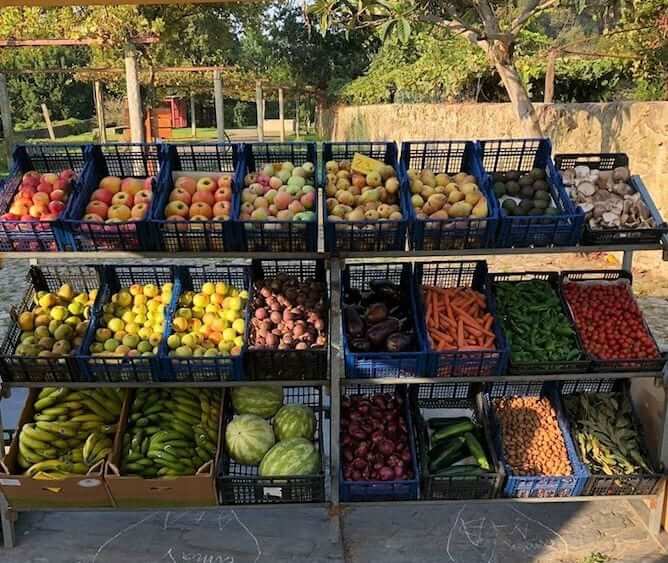
If you prefer organic products (me too!), You will be happy to know that on Saturday mornings there is a farmers’ market in Parque da Cidade. There is also a spectacular supermarket (albeit expensive) where you can buy everything you can imagine, including food and detergents in bulk, called Maçaroca Viva. There is also a chain spread throughout the city called Celeiro – personally I don’t like it because I find it very expensive, but it is a good place to buy supplements, for example.
Eat out
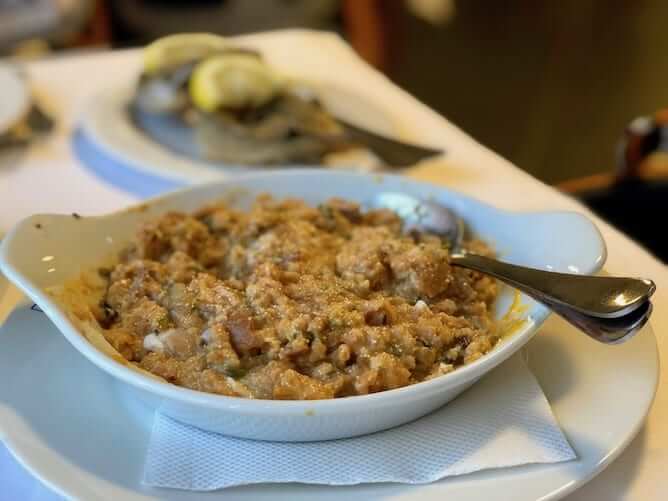
In Porto you can have the so-called “lunch menus”, which cost around 7€, and include soup, dish and drink. They are a healthy and economical option for people who work in the city and do not live at the door. Students also often use this type of offer.
A dinner, for example, in an average restaurant, costs, on average, about 15 / 20€ per person, and a craft beer between 3€ to 5€. Cocktails cost between 5€ to 12€.
Public Health in Portugal
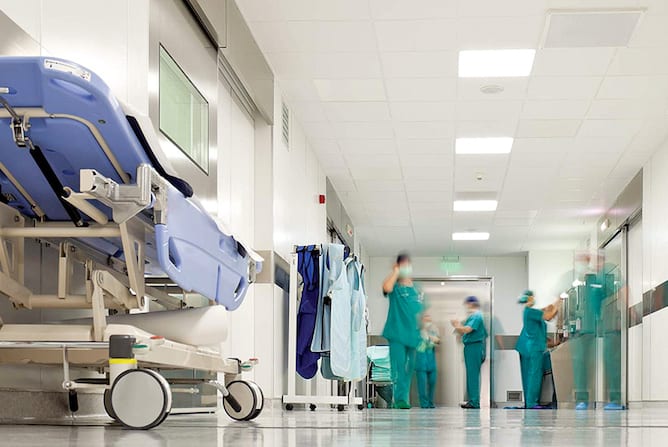
The Portuguese National Health System (SNS) is globally well ranked. For example, according to the annual ranking of the Euro Health Consumer Index, the Portuguese National Health System occupied, in 2018, the 13th position among 35 European national health services.
This classification is based on indicators such as patient rights and information, accessibility, results, diversity and scope of services provided, prevention and pharmaceutical products.
In an international study released by The Lancet (a British newspaper specialized in health), which analyzed the world evolution in the health panorama since 2000, in 2017 Portugal was among the 22 best countries in the world with regard to the health of its inhabitants.
This year also Portugal emerged in 22nd place among 180 countries in the world, in relation to the healthy development of children and adolescents. This ranking, created by WHO, UNICEF and The Lancet, aims to reflect the state of child health and well-being, which measures the fundamental conditions for children to thrive.
Structure of the Portuguese National Health System
Access to the Portuguese National Health Service (SNS) is universal, that is, the State guarantees the right to health protection for all its citizens. The Portuguese National Health Service is not, however, free, but the prices are reduced, which makes it accessible to the vast majority of the population.
The SNS consists of three major structures:
– Hospitals: large centralized structures that provide differentiated health care.
– Local health units: encompass all health centers and hospitals located in a city or region, in a single integrated area, responsible for providing primary and differentiated health care.
– Health centers: responsible for providing primary health care in the municipalities of residence.
If you happen to live in Porto, know that the city is served by two large hospitals – Santo António and São João – and has over 4000 health centers in its metropolitan area.
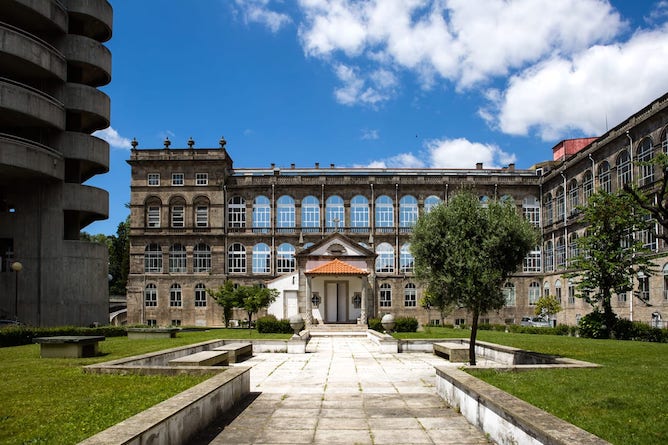
How much does it cost to use the Portuguese National Health System?
Access to the SNS is universal but is subject to the payment of user fees called taxas moderadoras. The values vary depending on the type of care provided: consultation, urgency, complementary diagnostic and therapeutic tests. To get an idea (forgive me if I make mistakes, it is not easy to translate medical terms!):
| Type of consult / service | Fee (Oct. 2020) |
|---|---|
| Medical Appointment (general medicine and family) | 4,5€ |
| Specialty Medical Appointment | 7€ |
| Medical Appointment at your home | 9€ |
| Medical Appointment without the patient’s presence | 2,5€ |
| Multipurpose emergency service | 18€ |
| Emergency service (Medical – Surgical) | 16€ |
| Basic Emergency Service | 14€ |
Exemption from taxas moderadoras (user fees) is applied to the following citizens: pregnant women, children and young people up to 18 years of age, users with a degree of disability equal to or greater than 60%, blood donors, donors of cells, tissues and organs, firefighters, transplant patients, military and ex-military personnel of the Armed Forces, young people in temporary or permanent reception, asylum seekers and refugees, users in a situation of economic insufficiency and unemployed enrolled in the employment center with an allowance less than or equal to 1.5 x IAS (653.64€) and their dependents.
Access to healthcare in Portugal for EU citizens
In accordance with European legislation, EU citizens are granted an equal status with nationals in the fields of social security and sickness, if they reside in a member country.
Thus in Portugal these citizens and their family members, must request a portable S1 document at the competent institution of the home Member State, and submit it to the District Social Security Center of the respective area of residence in Portugal. Then, Social Security will assign a number of users of the National Health Service, which will allow these citizens to fully enjoy the services of the NHS.
Access to healthcare in Portugal for third-country nationals (outside EU)
There are bilateral agreements between Portugal and other countries that guarantee conditions of reciprocity and equal treatment in relation to the Portuguese, in situations of stay and residence in our country (which include their family members).
Currently, agreements are in place with Andorra, Brazil, Cape Verde, Quebec, Morocco and Tunisia.
For example, a Brazilian citizen, beneficiary of the INSS, must apply for a PB4 (Certificate of Right to Medical Assistance – CDAM) at the State Centers of the Ministry of Health. Then, in possession of the document, he must go to the health center of the area of residence , here, and subscribe to the Portuguese SNS.
SNS 24

For a non-emergency situation, it is advisable to use the free SNS 24 line, through the number 808 24 24 24, a daily contact center that advises and directs users to the most suitable location. If, after the call, you have to go to the health center, you are exempt from paying taxas moderadoras.
Private Healthcare in Portugal
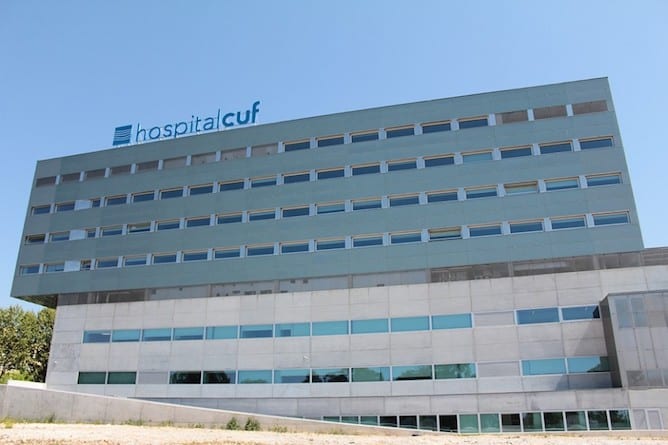
Portugal also offers several options when it comes to private healthcare. Despite the existence of a quality NHS that is accessible to the entire population, there are some benefits in private care, such as the possibility of choosing a family doctor and greater speed of care.
Private health is ensured by large groups of hospitals and clinics such as CUF, Luz Saúde or Lusíadas. However, smaller private offices are also found.
Health Insurance in Portugal
The demand for health insurance in Portugal has been growing, although it is not necessary to have health insurance to access private health care. However, if there is a preference for this type of care, it becomes heartfelt to buy health insurance because the cost of private services, without the participation of insurance, is high.
There are several health insurances, the value of which depends on the insurance company (there are many such Médis, Tranquilidade, Multicare, Allianz), the type of coverage selected and the age of the insured.
Generally speaking, a person aged 25 can pay around 10€ / month for basic insurance (which includes reimbursement for certain surgeries, hospitalizations and examinations in a hospital environment) at 60€ / month (which includes reimbursement for outpatient care and serious illnesses).
But a person with 40 will already be able to pay around 13€ / month for basic insurance and 83€ / month for full coverage, and so on.
These are not exact figures. If you are looking for health insurance, use comparison websites which, by providing basic data, will present you with several options.
Education in Porto

In Portugal there are public and private kindergartens, schools and universities.
Regardless of your choice, the education system is mandatory for all children from the age of 6, when they start the 1st year, until the age of 18, approximately, with the completion of secondary education.
Pre-school education – kindergarten and day care – is not mandatory. There are public nurseries and daycare centers, private or managed or belonging to Private Institutions of Social Solidarity. Prices vary according to location and geographic region, but expect to spend, on average, 150€ / month.
Structure of the Portuguese Education System
The Portuguese education system is divided in 3 levels: basic, secondary and higher.
Basic education:
– 1st cycle: 1st to 4th year of schooling (that is, from 6 to 10 years).
– 2nd cycle: 5th to 6th year of schooling (from 11 to 12 years old).
– 3rd cycle: 7th to 9th grade (from 13 to 15 years old).
High school:
Secondary education comprises a cycle of three years: 10th, 11th and 12th years of schooling.
At this level, students must choose whether they intend to attend a scientific-humanistic course, aimed at pursuing studies in higher education (sciences and technologies, socio-economic sciences, languages and humanities and visual arts), a professional course, an artistic and specialized course or a vocational course.
University:
After joining the Bologna Treaty, higher education was generally divided into three study cycles:
– Degree, lasting three years.
– Master’s degree, lasting two years.
– PhD, lasting between three to four years.
Still, keep in mind that not all courses have joined Bologna, so they have different structures, for example, medicine.
University in Porto
The University of Porto ranks 357º on the QS World University ranking, standing out for its academic reputation and the average number of citations per teacher. The ranking also takes into account the reputation among employers, the relationship between faculty and students, international students and international teachers.
In the Shangai ranking, one of the best known in the world, it maintains its position in the 301-400 range.
The internationalization of education has been one of the priorities of university leaders. The University of Porto is the second institution in the country that most welcomes foreign students.
At the start of the academic year 2019/2020, the University of Porto welcomed 5249 students from 93 countries. Of these, 3801 (among new students or already studying) were undergraduate students (that is, taking a complete course). Brazil led the contingent of the most represented nationalities, with 2866 students, followed by Mozambique (114), Italy (107) and Cape Verde (79).
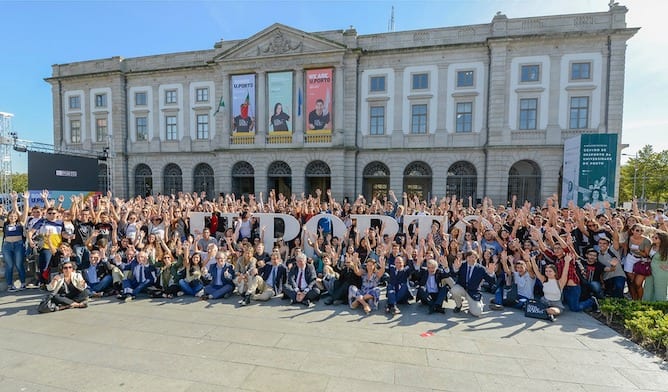
These figures reflect the success of the University of Porto’s trajectory, which, in 2014, created the International Student Statute (EEI), which regulates access to the university for candidates who do not have Portuguese nationality or another EU Member State.
Access is then made through the Special Access and Admission Competition for International Students.
For this purpose, candidates must hold a Portuguese secondary education diploma or equivalent qualification or hold a qualification that gives access to higher education.
In addition to the degree students, there were also 1546 students of 52 nationalities already at the University to complete a period of studies of six or twelve months, under programs such as Erasmus + among others.
Brazil continued to be the most represented country (594), followed by Spain (210), Italy (177), Poland (73) and Germany (68).
Live in Porto: public transports
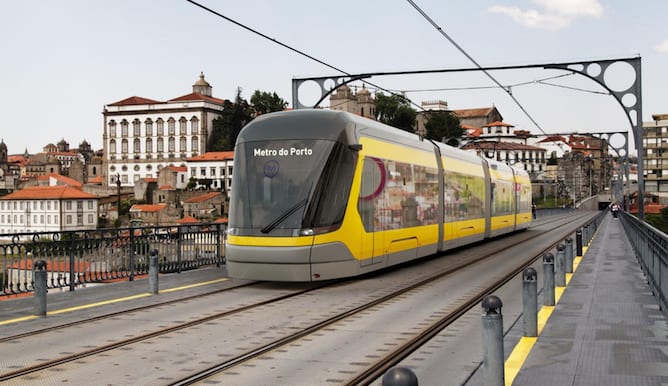
Porto’s Metropolitan Area is served by a comprehensive public transport network.
You can use the different means of transport – bus (STCP), metro and CP trains – using a single card called Andante. You can also buy a monthly subscription, “the monthly pass”, moving around the area, as many times as you want, whose quality / price ratio is very advantageous.
| Type of monthly pass | Average Price (2020) |
|---|---|
| Andante Municipal
Valid for traveling in a set of zones belonging to one municipality |
30€ |
| Andante Metropolitano
Valid for travel on all lines and operators integrated in the Andante intermodal system |
40€ |
| Andante Família 3Z / Municipal
Monthly subscription attributed to each member of the household that allows full payment of the amount equivalent to 2 subscriptions of Andante Municipal. Ideal for families. |
60€ |
| Andante Família Metropolitano
Monthly subscription attributed to each member of the household that allows full payment of the amount equivalent to 2 subscriptions of Andante Metropolitano. |
80€ |
Live in Porto: Safety
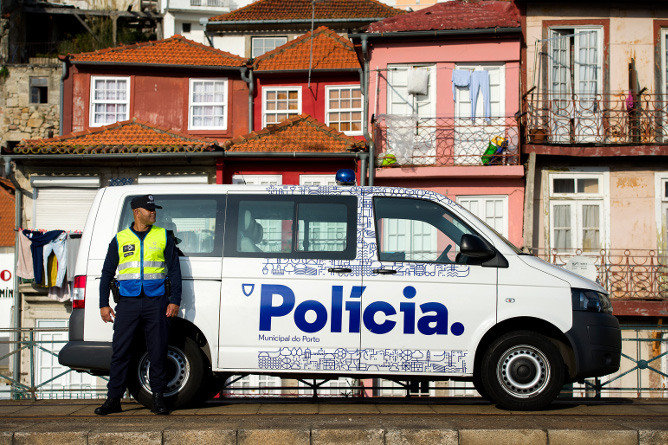
According to the Global Peace Index of 2020, Portugal occupies the first position in the ranking of the safest countries in the EU. Overall, it comes in third, after Iceland and New Zealand. It should be noted that, in 2014, it occupied the eighth position, which indicates a significant evolution in terms of security.
Consequently, Porto is undoubtedly a safe city, even in areas that may not look like it (don’t judge the book by its cover!). Most of the crimes committed are petty theft, fraud and some crime related to drug trafficking.
Please note that:
– Crimes related to drug trafficking are fewer today, due to a pioneering policy on decriminalising drug use, which has been implemented since the 2000s.
– The possession of weapons is subject to obtaining a license, traditionally for hunting, therefore, the violence that involves firearms, being non-existent, is very rare.
In an emergency – car crash, assault or theft – call 112 (the call is free).
Live in Porto: Jobs
The development of the Porto district has always been anchored in a strong commercial, industrial and export tradition. Today, it is no different.
Even so, the job market in Porto, as well as in Portugal, is not easy. It is mainly divided into more specialized functions, for which it is required to have a degree, and more general functions, which do not require a diploma. The latter are traditionally less well paid, and note that the minimum wage in Portugal is 635€.
Wages in Portugal are not very high, but the low cost of an excellent quality of life and good levels of security often make up for that.
However, if you want to live in Porto, don’t be discouraged. If you have training in areas such as marketing, accounting, finance, engineering and information technology, it is a matter of persistence.
Furthermore, the city has seen a boom in start-ups (for example, Blip, Farfetch, Talkdesk, Infraspeak, Huub) and independent professional communities, especially in the areas of technology and the creative industries, which is an opportunity for any foreigner looking for a job in Portugal.
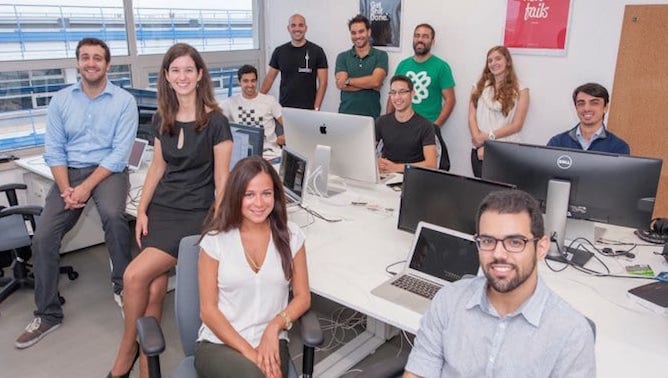
When you arrive in Portugal, you will not be alone. There are many coworking spaces that enhance the interaction between all types of professionals. They are privileged spaces to meet new people, to contact with different ideas and to increase your network of contacts. A good starting point is my article on the best coworking spaces in Porto.
Impact of Covid 19 on the job market in Northern Portugal
I cannot close this section without pointing out the negative impacts of the economic crisis generated by the pandemic COVID-19, which are already beginning to manifest. According to INE, in August 2020, the unemployment rate surpassed the 8% barrier, which has not happened since November 2017.
Specifically in the North, the number of unemployed increased by 23.4% (29,600 people) in May 2020, compared to the same month of 2019, and exports fell by 42.3% in April.
In the metropolitan area of Porto (we call it Distrito do Porto), the municipalities most affected were those with economic structures most exposed to the outside: for example, unemployment grew 90.4% in São João da Madeira, and 73.5% in Oliveira de Azeméis.
In economies where industrial employment is less important, and more flexible organizations with business models more adapted to telework are found, less significant increases were observed.
In the municipality of Vila Nova de Gaia, the registered unemployment growth was 11.9%, in Porto 14.9% and in Matosinhos 19%. In Espinho, 7.3%.
It is hoped (and I will too) that, with the positive resolution of the pandemic, the region will recover jobs quickly.
Families with kids: How to live in Porto

Living in Porto is a very attractive option for families with children. As mentioned in this article, Portugal has a good education system and a quality health service.
In addition, Porto is a safe city, with a good transport network and with many interesting activities for children, from museums for families to zoos. I always recommend visiting FC Porto Stadium and the World of Discoveries, , two spaces that the little ones love!
We are the third oldest country in Europe, but this does not definitely reflect in the attention we pay to the little ones. Also take a look at our article, where we prove that Porto is very child friendly.
Live in Porto: cultural activities
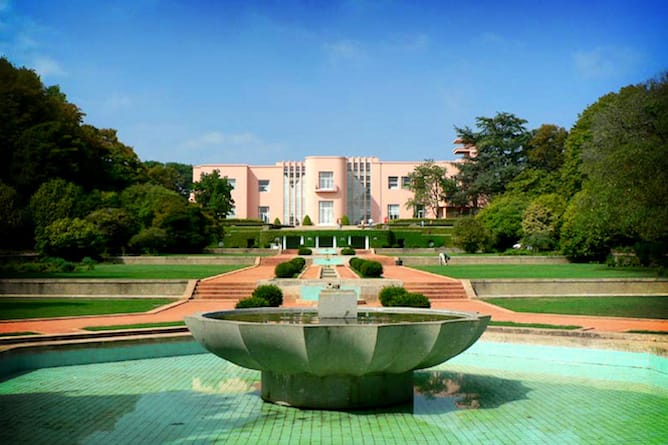
Porto has many interesting monuments and a diverse cultural life.
In addition to commercial cinemas, located in shopping malls, you will find exhibition places in the city with a more independent penchant, namely my much loved Cinema Trindade (in the center) or Cinema do Campo Alegre.
One of the major points of cultural interest, the National Theater of São João, always has a full and interesting agenda, as well as the Municipal Theater of Porto (either in Rivoli or Campo Alegre).
In Porto you will also find the Serralves Foundation, which houses the largest contemporary art museum in the country, but there are numerous art galleries and museums that are well worth a visit.
If you enjoy outdoor spaces, you will also find here a vast offer, among gardens and parks spread throughout the city.
Save this article for later:

